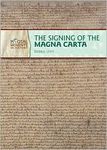Through the Looking Glass Children's Book Reviews
The Signing of the Magna Carta
Nonfiction
For ages 12 and up
Lerner, 2007 ISBN: 978-0822559177
Many of us have heard of the Magna Carta, the document that King John signed to appease his nobles in June of 1215, but do we really know what this document meant or why it came to be written?
Long before the much reviled King John came to the throne his brother King Richard, his father Henry I, and the Norman kings before them had a very unsettled relationship with England's noble families. In every way possible the kings found ways to wring money out of those who were bound to them. There were taxes, fines, scutage (a tax levied to pay for wars), and aid (extra taxes which nobles had to pay when the king needed additional money). Added up these financial demands became considerable and the nobles certainly felt the pinch. When King John came to the throne he made very little effort to befriend the nobles or to win their support and after some time the nobles had had enough. They had been taxes again and again and yet they saw no benefit from their relationship with the English crown. The time had come for change.
And so it was that King John, to avoid civil war, met with the representatives of the noble class and agreed to sign a document which laid out certain rights which the king would have to recognize.
What is interesting about this excellent book is that the author not only describes how King John came to sign the Magna Carta, but she also gives the reader a great deal of background information about the reign of the kings who proceeded King John on the throne of England. We are thus able to see that King John was not singly responsible for the state of affairs which led to the Magna Carta being written. Indeed his much admired brother Richard the Lionheart put a terrible strain on the financial resources of England. John just added to an already very bad situation and he did not have the skill to charm his dependents into liking him.
The author also takes pains to explain that though the Magna Carta was an extraordinary document, it did not have much of an impact at first. It did bring about an uneasy peace between John and the nobles it is true, but it was after John's death that the true value of the Magna Carta began to be appreciated. Over the years it became the basis for many important documents including the Universal Declaration of Human Rights.
This is one of the titles in the "Pivotal Moments in History" series. Other titles in this collection include "The Fall of the Roman Empire" and "The Norman Conquest of England."




